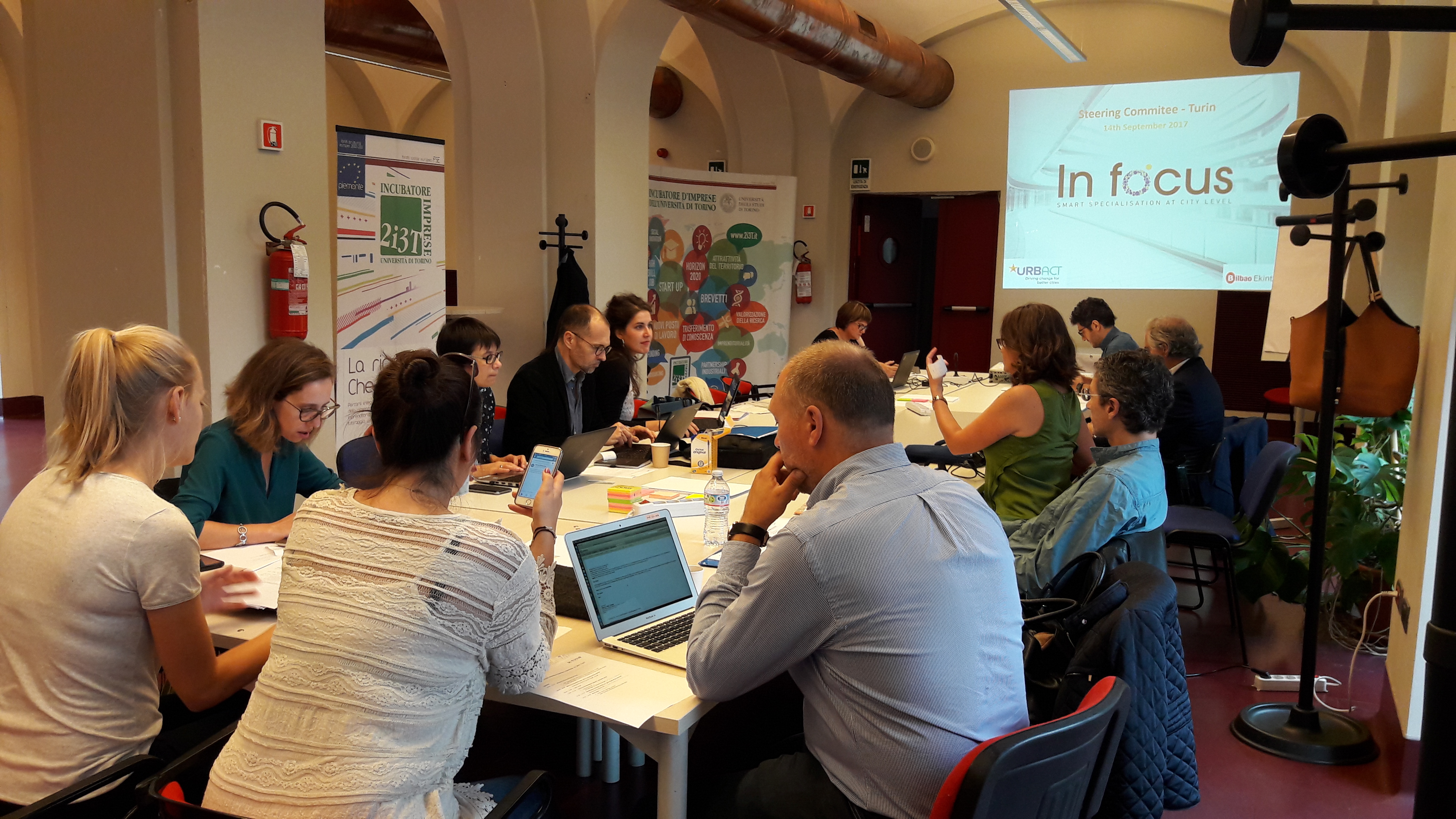Boosting the entrepreneurial scene: maximizing the ecosystem approach
Edited on
18 May 2018Entrepreneurship and new firms do not emerge in isolation: it is very much embedded in the local economy & culture. How do we play on that? And how can city and region collaborate? URBACT IN FOCUS partners reflected on these and more interesting questions in the network’s third transnational meeting held in Turin from the 13rd to the 14th of September 2017.

The 10 members of the IN FOCUS project gathered and exchanged experiences regarding their efforts to boost entrepreneurship in the city, in collaboration and alignment with the region. During two intensive days, we had the opportunity to reflect on local entrepreneurial ecosystems and how to boost them, in the context of smart specialisation strategies of cities and regions.
On the first day of the meeting, after a brief introduction to the workshop theme by Mr Willem van Winden, Ad-hoc Expert for IN FOCUS, who elaborated the core idea of the entrepreneurial ecosystem: what is it, and what are its elements and characteristics, we had the opportunity to discuss some specific aspects of policies regarding entrepreneurship that we focused on during the workshop: the relation with smart specialisation approach; start-up promotion policies; fostering a culture of entrepreneurship; and the different stages in entrepreneurship: Starting, scaling, growing.
The workshop was divided into four key sessions. Session 1, “setting the scene”, we discussed the role of entrepreneurship ecosystems in the wider framework of smart specialisation. Session 2 focused on start-up policies; Session 3 on the creation of a culture of entrepreneurship; and Session 4, dealt with the question of scaling up after the initial set-up of a company.
On each session of the workshop we had the chance to learn from one or more examples from cities in the IN FOCUS network. For instance, we learnt about the MIP programme in Turin that indicated that the success of more “mundane” start-ups (i.e. not in high tech of advanced services) can be greatly enhanced when they obtain a small amount of support and coaching; or Frankfurt, which announced to make a single website with all the start-up support available in region and city. This website would help start-ups to understand and navigate through the rich variety of support measures, and find the ones that fit them best. In the same way, Big Bilbao, the new Centre for Entrepreneurship in Bilbao, seeks to become the main information and guidance hub for matters relating to entrepreneurship in the city and its surrounding area, creating a stable network of collaborators (comprising actors from different fields of activity, such as public institutions, academic institutions, companies, social agents, other Centres, etc.), and creating a cohesive entrepreneurship ecosystem.

Another important message from the workshop was that a culture of entrepreneurship is fostered when there are concrete physical spaces and places where entrepreneurs, not only starting ones, can meet and interact.
One of the co-founders of the start-ups behind Founders Founders from Porto explained how they developed a new house for entrepreneurs that had outgrown the incubation stage. As a community, and supported by the city, they bought a house and redeveloped it as post-incubation space for firms, where they can easily meet each other and exchange knowledge-ideas, share difficulties, challenges or solutions and learn from each other.
The leader of an incubator from Université Grenoble-Alpes (and successful founder in the past) stressed that a culture of entrepreneurship asks that (young) people are seduced to become entrepreneurs. Then, the next question is how seduction works. An important factor is visibility: students will be more likely to go for a career as entrepreneur when they see how their fellow students have done so successfully.
The leader from Torino Social Innovation, and “start-up in residence”, showed how the city of Turin seeks to promote entrepreneurship to solve societal challenges. In this sense, the city shifted from a grants and financial incentives approach to an approach in which urban challenges are defined (for example, the refurbishment of a square), and invites entrepreneurs to develop and deliver a solution, that can be purchased by the city when it works.
Finally, Bordeaux Technowest explained how they support companies to scale up. They give support to innovative projects through different tools such as incubators, a business centre, accommodation, advice, creation assistance, business takeover or industrial implantation, technology transfer and patent valuation, assistance to search for financing and partnerships…
In summary the workshop revealed a number of viable options to improve local and regional entrepreneurial ecosystems, and resulted in concrete suggestions and lessons. One main lesson for cities and regions was to especially support specific start-up incubation in fields in which the city/region is already specialised. Also it underlined the importance for regions and cities, in working in co-operation, –very central in the IN FOCUS project.
During the workshop, we had also the opportunity to visit Agroinnova Competence Centre for Innovation in the Agroenvironmental field, which carries out basic and applied research, knowledge and technology transfer, life-long learning and communication on up-to-date topics in the agro-environmental and agro-food sectors. On the second day of the meeting, we visited the Business Incubator and Technology Transfer process at the University of Turin (2i3T), and learn more about how they focus on commercially valorising the results of academic research by creating, promoting and supporting new, knowledge-intensive business.
Submitted by slopez on
